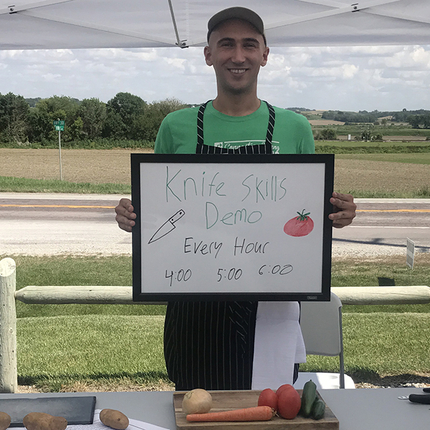By Jordan Feyerherm, former staff member
With farmers market season upon us, we’re all excited to dive into the tasty local harvest. But how can we get the most out of this delicious produce? Proper preparation!
This summer, I will be at the Harrison County Farmers Market in Missouri Valley, Iowa, hosting fun, interactive culinary demonstrations for the whole family. Last month, I hosted a knife skills demo.
For many of us, knife maintenance, care, and proper usage can be an afterthought. However, well-maintained, sharp knives can make cooking more fun, easier, safer, and even tastier.
Here are some tips, facts, and tidbits to get the most out of your knives, and the produce they cut.
A sharp knife is safer than a dull knife
While it may not seem intuitive, a sharp knife is always safer than a dull knife. A sharp knife used for the appropriate application will cut with little effort, while a dull knife requires more force applied to the blade, making a more dangerous situation for your fingers. To keep your knives (and fingers) happy, sharpen them once a year, and hone them with steel before each use.
Use your knife for its intended purpose
While a chef’s knife certainly can be used to peel a carrot, and a paring knife will cut a chicken, it is always easier and more effective to use the appropriate knife for the job. A chef’s knife should be used to cut and break down large items, while paring knives are more suited to small, detailed applications.
The Claw!
Almost everyone who makes a habit of cooking has a few “battle wounds” from the kitchen. A great way to avoid those are to use the “claw hand” technique. Curl your fingers and thumb of your off hand and rest them on top of whatever you are about to cut, using your thumb to keep the item stable. This ensures the safety of your fingers, while helping you achieve even cuts.
Always hand wash and dry your knives
After using your knives, a quick trip to the dishwasher may sound like a tempting proposition. However, your knives will appreciate you for resisting the urge. Dishwashers will knock your knives around during the washing process, causing them to dull and corrode the cutting edge.
Never store uncovered knives in a drawer
Another mortal enemy of a sharp knife is the kitchen drawer. Much like the dishwasher, leaving your knives in a drawer will cause them to knock around and become nicked and dulled. This could also pose a threat to your fingers when reaching into the drawer to retrieve a knife.
Use plastic or wooden cutting boards
Equally important to what you cut with, is what you cut on. While stone and glass cutting boards may look nice, they will dull your knives in a hurry. Remember, something has to give: if your knife doesn’t leave marks on the cutting board, the cutting board is leaving marks on your knife (in the form of a dulling blade). Always choose wood or plastic!
Anchor your cutting board
Always make sure your cutting board is securely “anchored,” meaning it won’t move around while using it. Some cutting boards have rubber feet or edges that anchor them in place. If yours does not, simply place a wet dish rag underneath your cutting board to achieve the same effect.
With a little practice and patience, these tricks will go a long way in keeping you safe and your meals tasty!
Feature photo: Jordan at the Harrison County Farmers Market. He has a degree in culinary arts and eight years of cooking experience in restaurants, catering, and farmers markets. He enjoys answering cooking questions around preparation, techniques, preservation, and general tips and tricks.




